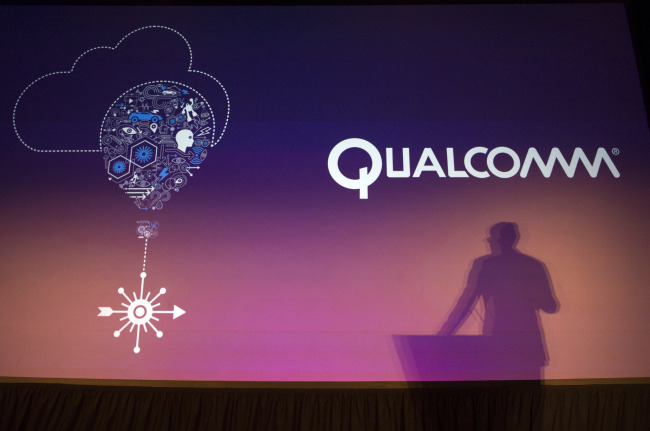Samsung Electronics is considering joining Qualcomm’s AllJoyn project, but there is some debate over the possibility as Samsung is currently developing its own Internet of Things platform, industry watchers said Wednesday.
AllJoyn is an open-source platform that allows all smart devices ― regardless of brand ― to recognize each other and share information. Simply put, Samsung and LG’s smart home appliances and electronics can become compatible through this communication protocol.
The platform, which was developed by Qualcomm, is now a collaborative project of the AllSeen Alliance, which has around 50 members including LG Electronics, Panasonic and Sharp.
 |
Steven Mollenkopf, chief executive officer of Qualcomm Inc., speaks during a press conference at the 2014 Consumer Electronics Show. (Bloomberg) |
“We are considering (whether to join the alliance),” said Oh Ji-sung, Samsung Electronics Digital Media & Communications Center’s principal engineer, following an IoT conference on the day.
For compatibility of different brands in the smart home market, “standardization is necessary,” he added.
Qualcomm sounded more cautious on the issue. “We cannot specify the reason (as to why Samsung has not joined yet). However, it is not a technical but a business issue,” said a source from Qualcomm who declined to be identified.
This is because Samsung Electronics, a dominant player in the global smart device, electronics and home appliance markets, wants to build its own IoT platform favorable to its products, industry watchers said.
Samsung is currently developing a similar platform called Samsung Architecture for Multimodal Interactions, or SAMI.
Last October, the company hired Luc Julia, a former engineer for Apple’s Siri, to head the SAMI project in partnership with around 50 companies at its Open Innovation Center in Silicon Valley.
“Through the SAMI, data in any device can be delivered in the original form,” Luc Julia said during a conference in San Francisco last November.
“People will tap data more conveniently through diverse devices,” he said, hinting that the company aims to make the platform an industry standard in the future IoT market.
“For its software technologies, Samsung has long relied on other tech moguls such as Google. As it longs for having its own software platform down the road, the possibility of joining Qualcomm’s alliance is not high,” an anonymous analyst said.
Samsung has recently been moving away from its long-time ally Google’s Android system to switch to its own operating system, Tizen. The company will reportedly use the Tizen OS for all of its new smart home appliances and electronics including its new Gear Blink, which is expected to be unveiled at the IFA technology show in September.
By Shin Ji-hye (
shinjh@heraldcorp.com)








